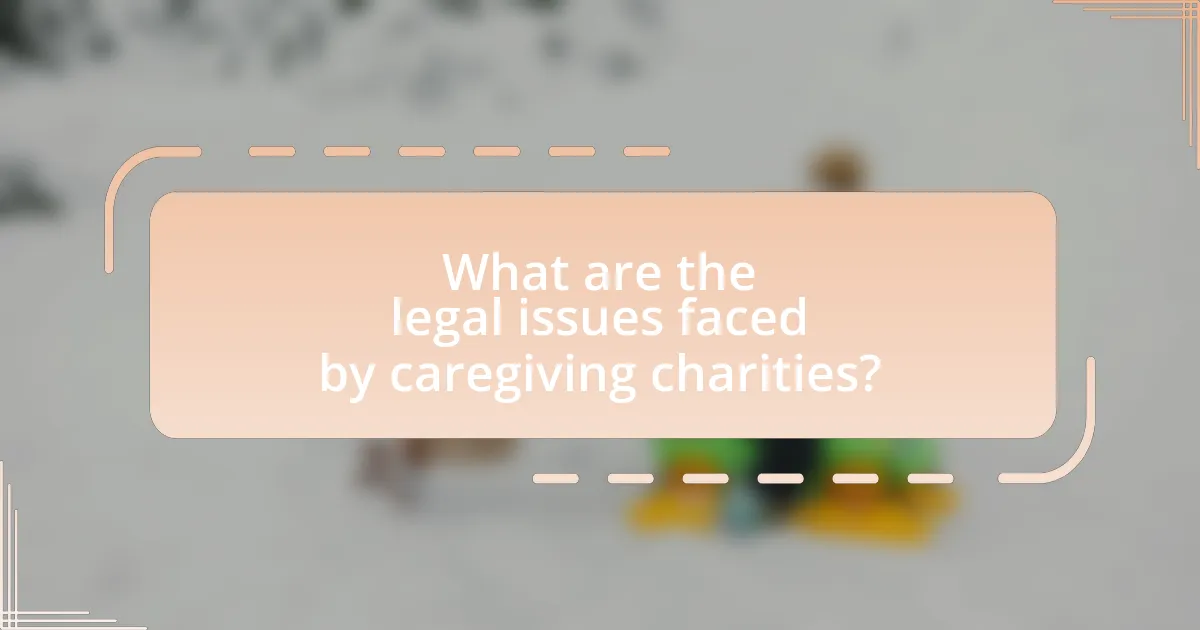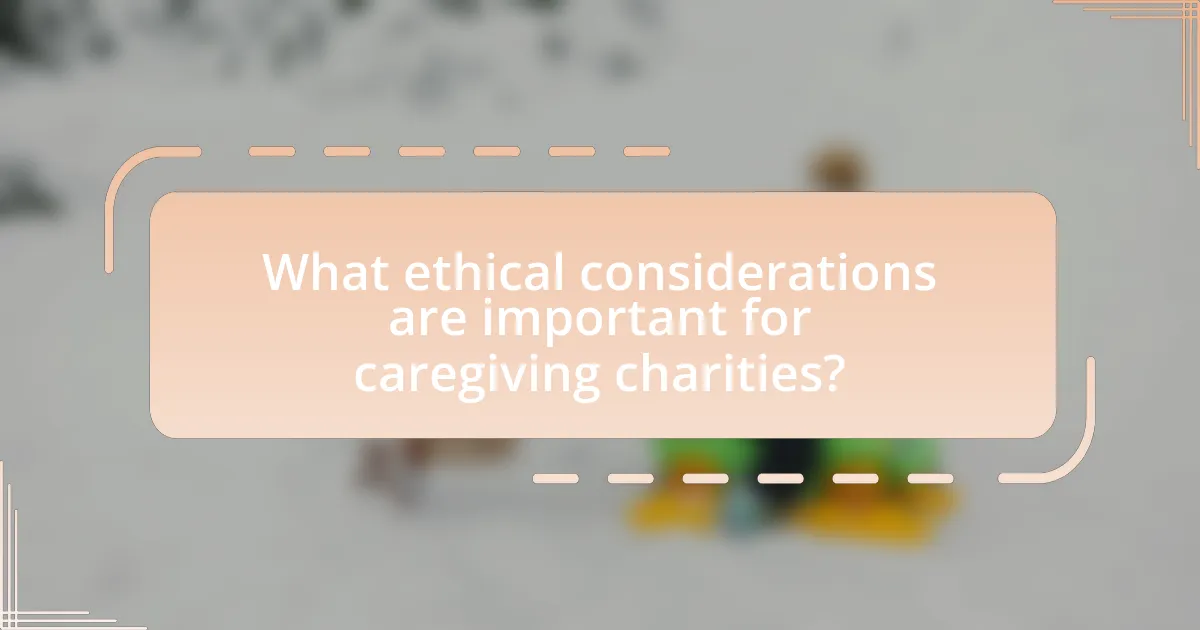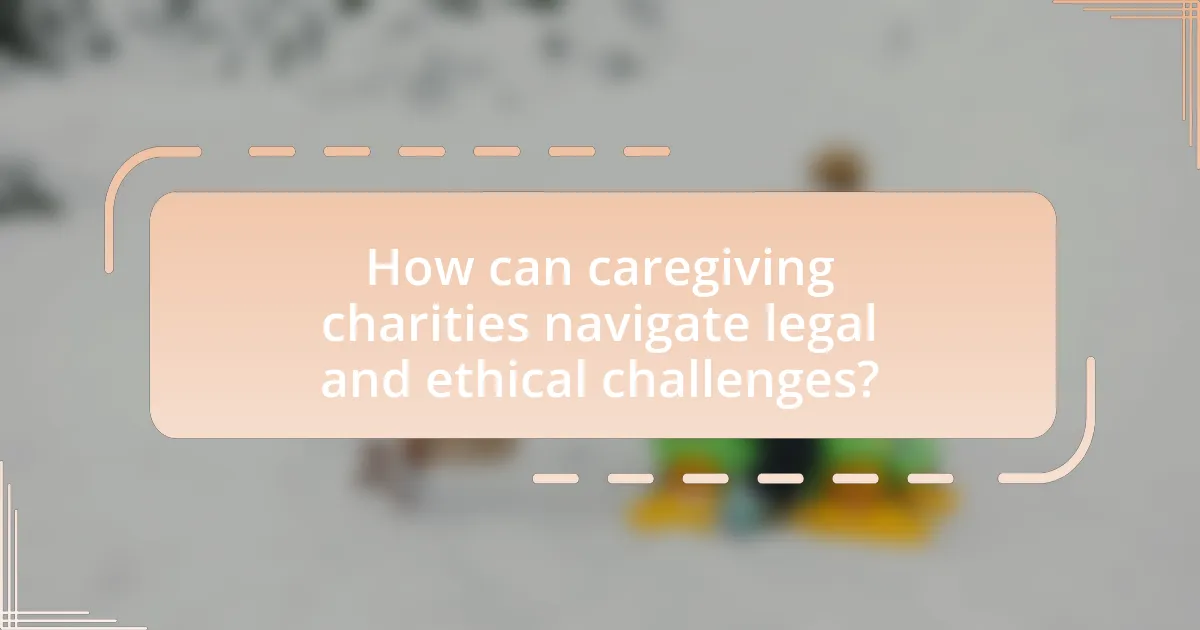Caregiving charities are nonprofit organizations that provide essential support and services to individuals in need, but they face significant legal and ethical challenges. This article examines the various legal issues these charities encounter, including compliance with nonprofit regulations, liability for caregiver actions, and adherence to privacy laws such as HIPAA. It also explores the impact of state and federal regulations, the consequences of legal non-compliance, and the importance of ethical considerations like transparency and accountability. Additionally, the article outlines best practices for navigating these challenges, including the role of legal counsel and strategies for fostering a culture of ethics within caregiving organizations.

What are the legal issues faced by caregiving charities?
Caregiving charities face several legal issues, including compliance with nonprofit regulations, liability for caregiver actions, and adherence to privacy laws. Nonprofit regulations require these organizations to maintain transparency in financial reporting and governance, which can lead to legal challenges if not properly managed. Liability issues arise when caregivers are accused of negligence or misconduct, potentially exposing the charity to lawsuits. Additionally, privacy laws, such as the Health Insurance Portability and Accountability Act (HIPAA), mandate strict handling of personal health information, and violations can result in significant penalties. These legal challenges necessitate careful navigation to ensure compliance and protect the organization from potential legal repercussions.
How do regulations impact caregiving charities?
Regulations significantly impact caregiving charities by dictating operational standards, funding eligibility, and compliance requirements. These regulations ensure that charities maintain transparency, accountability, and ethical practices, which can enhance public trust and support. For instance, the IRS requires charities to adhere to specific tax-exempt status guidelines, influencing how they manage donations and report financial activities. Additionally, state regulations may impose licensing requirements for caregiving services, affecting the scope of services offered and the ability to receive government funding. Compliance with these regulations is crucial, as failure to meet them can result in penalties, loss of funding, or revocation of tax-exempt status, thereby directly affecting the charity’s sustainability and effectiveness in providing care.
What specific laws must caregiving charities comply with?
Caregiving charities must comply with various specific laws, including the Internal Revenue Code, which governs tax-exempt status under Section 501(c)(3), and state charity registration laws that require organizations to register before soliciting donations. Additionally, they must adhere to the Health Insurance Portability and Accountability Act (HIPAA) to protect patient privacy and confidentiality. Compliance with the Americans with Disabilities Act (ADA) is also essential to ensure accessibility for individuals with disabilities. These laws collectively ensure that caregiving charities operate legally and ethically while providing necessary services.
How do state and federal regulations differ for caregiving charities?
State and federal regulations for caregiving charities differ primarily in their scope and enforcement mechanisms. Federal regulations, such as those enforced by the Internal Revenue Service (IRS), establish nationwide standards for tax-exempt status under Section 501(c)(3) of the Internal Revenue Code, requiring charities to operate exclusively for charitable purposes and adhere to specific reporting requirements. In contrast, state regulations vary significantly, as each state has its own laws governing charitable organizations, including registration, fundraising practices, and operational compliance, which can include additional requirements like state-specific audits or financial disclosures. For example, some states mandate annual financial reports to be filed with the state attorney general, while federal regulations do not impose such state-specific requirements. This divergence necessitates that caregiving charities navigate both layers of regulation to ensure compliance at both the state and federal levels.
What are the consequences of legal non-compliance?
Legal non-compliance can result in severe penalties, including fines, legal action, and loss of operational licenses. For caregiving charities, failure to adhere to regulations can lead to financial instability, damage to reputation, and loss of trust from stakeholders. For instance, the IRS can impose fines for non-compliance with tax-exempt status requirements, which can jeopardize funding and support. Additionally, legal actions from clients or regulatory bodies can result in costly litigation, further straining resources.
What legal actions can be taken against non-compliant caregiving charities?
Legal actions that can be taken against non-compliant caregiving charities include revocation of tax-exempt status, civil penalties, and criminal charges. Regulatory bodies, such as the Internal Revenue Service (IRS) in the United States, can revoke a charity’s tax-exempt status if it fails to comply with federal regulations, which can lead to significant financial repercussions. Additionally, state attorneys general can impose civil penalties for violations of state charity laws, which may include fines or mandated restitution. In severe cases, criminal charges can be pursued against individuals responsible for fraudulent activities or mismanagement of funds, as evidenced by cases where charity executives have faced prosecution for embezzlement or fraud.
How can legal issues affect the reputation of caregiving charities?
Legal issues can significantly damage the reputation of caregiving charities by undermining public trust and confidence. When a charity faces legal challenges, such as allegations of fraud, mismanagement, or failure to comply with regulations, it can lead to negative media coverage and public scrutiny. For instance, a study by the Nonprofit Risk Management Center found that 70% of donors are less likely to support organizations that have been involved in legal disputes. This decline in donor confidence can result in reduced funding and support, further exacerbating the charity’s operational challenges. Additionally, legal issues can create a perception of incompetence or unethical behavior, which can deter potential volunteers and partners, ultimately harming the charity’s ability to fulfill its mission.

What ethical considerations are important for caregiving charities?
Ethical considerations for caregiving charities include transparency, accountability, and respect for the dignity of individuals served. Transparency ensures that donors and stakeholders understand how funds are utilized, which builds trust and encourages continued support. Accountability involves adhering to legal standards and ethical guidelines, ensuring that the charity operates effectively and responsibly. Respect for the dignity of individuals served emphasizes the importance of treating beneficiaries with compassion and recognizing their rights, which is crucial for maintaining ethical integrity in caregiving practices. These considerations are supported by the principles outlined in the National Council of Nonprofits, which highlights the necessity of ethical governance in nonprofit organizations.
How do caregiving charities ensure ethical practices?
Caregiving charities ensure ethical practices by implementing strict governance policies and adhering to established ethical guidelines. These organizations often follow frameworks such as the National Council of Nonprofits’ ethical standards, which emphasize transparency, accountability, and respect for beneficiaries. Additionally, many caregiving charities conduct regular audits and evaluations to assess compliance with ethical practices, ensuring that funds are used appropriately and that services meet the needs of those they serve. For instance, the Better Business Bureau’s Wise Giving Alliance provides standards for accountability that many charities strive to meet, reinforcing their commitment to ethical operations.
What ethical guidelines should caregiving charities follow?
Caregiving charities should follow ethical guidelines that prioritize transparency, accountability, and respect for the dignity of those they serve. These guidelines include ensuring informed consent from beneficiaries, maintaining confidentiality of personal information, and avoiding conflicts of interest. For instance, the National Council of Nonprofits emphasizes the importance of ethical fundraising practices, which require charities to provide clear information about how donations will be used. Additionally, adherence to the principles outlined in the Code of Ethics for Nonprofit Organizations, which includes integrity and fairness, further supports ethical operations within caregiving charities.
How can caregiving charities address conflicts of interest?
Caregiving charities can address conflicts of interest by implementing strict governance policies and transparency measures. Establishing a code of ethics that outlines acceptable behaviors and decision-making processes helps ensure that all stakeholders understand their responsibilities. Regular training sessions on conflict of interest policies for board members and staff can further reinforce these standards. Additionally, conducting regular audits and reviews of financial transactions and decision-making processes can identify potential conflicts early, allowing for timely resolution. Research indicates that organizations with clear conflict of interest policies experience fewer ethical breaches, thereby enhancing their credibility and trustworthiness within the community.
Why is transparency crucial for caregiving charities?
Transparency is crucial for caregiving charities because it builds trust with donors, beneficiaries, and the public. Trust is essential for securing funding and support, as studies show that 90% of donors consider transparency a key factor in their giving decisions. Furthermore, transparency ensures accountability, allowing stakeholders to verify that funds are used effectively and ethically, which is vital in maintaining compliance with legal standards and ethical guidelines in the caregiving sector.
What are the benefits of maintaining transparency in operations?
Maintaining transparency in operations enhances trust and accountability within caregiving charities. When organizations openly share their processes, financial information, and decision-making criteria, they foster a culture of integrity that encourages stakeholder confidence. Research indicates that 70% of donors are more likely to support charities that demonstrate transparency in their operations, as highlighted in the 2021 Nonprofit Transparency Report by the Nonprofit Finance Fund. This trust not only attracts funding but also strengthens community relationships, ultimately leading to improved service delivery and compliance with legal and ethical standards.
How can caregiving charities effectively communicate their ethical standards?
Caregiving charities can effectively communicate their ethical standards by developing clear, accessible policies and guidelines that outline their ethical commitments. These organizations should utilize multiple communication channels, such as websites, social media, and community outreach, to disseminate this information widely. For instance, a study by the Nonprofit Research Collaborative found that 70% of donors prefer transparency regarding how charities operate, indicating that clear communication of ethical standards can enhance trust and donor engagement. Additionally, regular training sessions for staff and volunteers on ethical practices can reinforce these standards internally, ensuring that all members are aligned with the charity’s ethical framework.

How can caregiving charities navigate legal and ethical challenges?
Caregiving charities can navigate legal and ethical challenges by implementing comprehensive compliance programs and fostering transparency. These programs should include regular training on relevant laws, such as the Health Insurance Portability and Accountability Act (HIPAA) for patient privacy, and ethical guidelines to ensure that caregivers act in the best interest of those they serve. Additionally, establishing clear policies for reporting unethical behavior and creating a culture of accountability can help mitigate risks. Research indicates that organizations with strong ethical frameworks experience fewer legal issues, as seen in a study by the Ethics Resource Center, which found that 41% of employees in organizations with ethics programs reported misconduct, compared to 60% in those without.
What strategies can be implemented to ensure compliance?
To ensure compliance in caregiving charities, organizations can implement a combination of robust training programs, regular audits, and clear communication of policies. Training programs educate staff on legal and ethical standards, ensuring they understand their responsibilities. Regular audits assess adherence to these standards, identifying areas for improvement. Clear communication of policies fosters a culture of transparency and accountability, making it easier for staff to follow guidelines. According to a study by the National Council of Nonprofits, organizations that engage in regular training and audits are 30% more likely to maintain compliance with legal requirements.
How can training programs help staff understand legal and ethical issues?
Training programs can help staff understand legal and ethical issues by providing structured education on relevant laws, regulations, and ethical standards specific to caregiving charities. These programs often include case studies, role-playing scenarios, and discussions that illustrate the consequences of legal violations and ethical dilemmas, thereby enhancing comprehension. Research indicates that organizations with comprehensive training see a 30% reduction in compliance violations, demonstrating the effectiveness of such educational initiatives in fostering a culture of accountability and ethical decision-making among staff.
What role does legal counsel play in caregiving charities?
Legal counsel plays a crucial role in caregiving charities by providing guidance on compliance with laws and regulations that govern nonprofit organizations. This includes advising on issues such as tax-exempt status, employment law, and donor agreements, ensuring that the charity operates within legal frameworks. Legal counsel also assists in drafting and reviewing contracts, protecting the organization from potential liabilities, and helping to navigate disputes that may arise. For instance, according to the National Council of Nonprofits, legal advice is essential for maintaining compliance with state and federal regulations, which can vary significantly and impact the charity’s operations.
What best practices can caregiving charities adopt for ethical governance?
Caregiving charities can adopt several best practices for ethical governance, including establishing a clear code of ethics, ensuring transparency in financial reporting, and implementing robust conflict-of-interest policies. A code of ethics provides a framework for decision-making and behavior, guiding staff and volunteers in their interactions with beneficiaries and stakeholders. Transparency in financial reporting, such as regular audits and public disclosures, fosters trust and accountability, as evidenced by the increased donor confidence reported by organizations that practice open financial communication. Additionally, conflict-of-interest policies help prevent unethical practices by requiring board members and staff to disclose any personal interests that may influence their decisions, thereby safeguarding the charity’s integrity and mission.
How can caregiving charities create a culture of ethics and compliance?
Caregiving charities can create a culture of ethics and compliance by implementing comprehensive training programs that emphasize ethical standards and legal requirements. These programs should include regular workshops and seminars that educate staff and volunteers about the importance of ethical behavior, compliance with regulations, and the consequences of unethical actions. Research indicates that organizations with strong ethics training see a 25% reduction in compliance violations, highlighting the effectiveness of such initiatives. Additionally, establishing clear policies and procedures, along with a transparent reporting system for ethical concerns, fosters an environment where ethical behavior is prioritized and encouraged. Regular assessments and feedback mechanisms can further reinforce this culture, ensuring that ethical practices are continuously evaluated and improved.
What resources are available for caregiving charities to improve their practices?
Caregiving charities can access various resources to improve their practices, including training programs, best practice guidelines, and funding opportunities. Organizations such as the National Alliance for Caregiving provide comprehensive training and resources tailored to enhance caregiving skills and ethical practices. Additionally, the Administration for Community Living offers grants and funding opportunities specifically aimed at supporting caregiving initiatives. Research from the Family Caregiver Alliance highlights the importance of evidence-based practices, which can be found in their resource library, offering tools and information to help charities implement effective caregiving strategies.
What practical steps can caregiving charities take to avoid legal and ethical pitfalls?
Caregiving charities can avoid legal and ethical pitfalls by implementing comprehensive policies and training programs focused on compliance and ethical standards. Establishing clear guidelines for staff and volunteers regarding confidentiality, informed consent, and conflict of interest is essential. Regular training sessions on legal obligations, such as those outlined in the Health Insurance Portability and Accountability Act (HIPAA), ensure that all personnel understand their responsibilities. Additionally, conducting regular audits and assessments of organizational practices helps identify potential risks and areas for improvement. Engaging with legal counsel to review policies and practices can further safeguard against legal issues. These steps are supported by the fact that organizations with robust compliance programs significantly reduce the likelihood of legal disputes and enhance their ethical standing in the community.